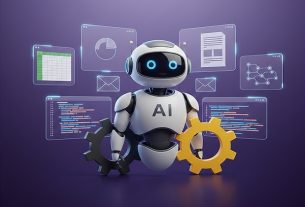The world of programming is evolving faster than ever, and as technology continues to advance, AI-powered development tools are becoming a game-changer for developers, IT professionals, and businesses. Gone are the days when coding was a manual, time-consuming task. Now, with a plethora of AI tools at their disposal, programmers are experiencing an alluring experience of working more efficiently and effectively than ever before. Whether you’re a veteran developer or someone with a rudimentary understanding of the field, these tools are here to make your life easier and help you stay ahead of the curve.
As we step into 2025, AI tools are no longer a stereotype of the future—they are very much a reality. These tools are mostly geared towards automating repetitive tasks, enhancing code quality, and optimizing workflows, ensuring developers keep their code well-designed, error-free, and seamless all across, yet helping them save significant amount of time.
Here are the top 10 AI tools that every programmer should consider using in 2025 and later on:
1- GitHub Copilot
GitHub Copilot has been a whopping success since its launch, and it’s only getting better. This AI-powered code completion tool uses OpenAI’s Codex model to suggest code snippets as you type. It not only saves time but also helps you write more efficient code. GitHub Copilot is so fascinating that it often predicts your next line of code before you’ve even typed it out fully. The tool is so advanced that it outperforms some of the code suggestions facilities offered by the traditional IDEs.
2- Tabnine
If you’re looking for a tool that can seamlessly integrate with your IDE to enhance your coding potential, Tabnine is the answer. This tool offers AI-driven code completions and suggestions that help streamline your development process. Developers who are believe in Teamwork Makes The Dream Work Slogan will appreciate Tabnine’s collaborative features, where teams can share custom AI models, improving the codebase across the board.
Codota and Tabnine have been merged, and now Tabnine is the main brand. Codota was initially focused on AI-powered code completion, particularly for Java, while Tabnine provided AI-based autocomplete for multiple programming languages.
Just like Tabnine, Codota is an AI code completion tool that’s perfect for Java, Kotlin, and other languages. What makes Codota stand out is its ability to give real-time suggestions based on billions of code examples from open-source repositories. It’s like having access to a veteran developer’s years of expertise right in your IDE, guiding you through each step of your code-writing journey. Codota offers a remarkable ability of writing matured and well-woven code within the competitive landscape of code assistance tools, as it outperforms others in terms of quality and precision.
3- Kite
For Python developers, Kite is the platform-skeptic’s worst nightmare. It is a tremendous AI code completion tool that works across various IDEs. With Kite, developers can code more quickly by having context-aware code suggestions that underpin their work with accuracy. This tool has a myriad of features, including documentation generation and multi-line completions. It’s like having a pair of extra eyes that spot potential issues before they arise.
4- DeepCode
DeepCode is like a personal code review assistant, leveraging AI to cast a shadow over your code to find bugs and vulnerabilities before they deliver it to production. It scans your code-base and provides instant feedback on potential issues, helping you prevent unauthorized data access and data theft over the wire. This tool is a must-have for any developer who cares about writing secure, efficient, and seamless code.
5- Amazon CodeWhisperer
Amazon CodeWhisperer is a relatively new entrant, but it’s ready to make its mark. Designed to help developers write secure and efficient code, it offers real-time suggestions and even flags potential security vulnerabilities. Its focus on preventing unauthorized data access and data theft over the wire, makes it a favorite among security-conscious teams. For developers who take security as a serious aspect, CodeWhisperer is the right tool for them.
6- IntelliCode by Microsoft
IntelliCode is one of the most popular AI tools for Visual Studio. It analyzes your code and provides intelligent suggestions based on best practices and the specific patterns in your code. Whether you’re working with C#, Python, or JavaScript, IntelliCode is overwhelming in its ability to predict what you’re likely to write next and ensure your code is on the right track. It also helps spot the coding inefficiencies, giving you the opportunity to optimize your code before running it.
7- ChatGPT (for Programming)
Being the pioneer of Generative AI ChatGPT has already earned a great deal of acclaim and fame. As AI continues to evolve, tools like ChatGPT are becoming an essential resource for developers. The ability to ask natural language questions and get instant, context-aware coding solutions is nothing short of revolutionary. Whether you’re debugging or learning a new language, ChatGPT can act as your AI assistant on call, stirring up a huge controversy by making some traditional development tasks seem a bit redundant. With its power, it’s easy to see why developers are embracing it in droves.
8- Synk
Snyk focuses on one of the most critical aspects of software development: security. This tool helps developers prevent unauthorized data access by scanning for vulnerabilities in dependencies and open-source libraries. It offers real-time security alerts and guidance on how to fix issues, which helps teams maintain secure code-bases without the need for constant human oversight. The tool is a perfect example of how AI can support the security aspect of development, reducing risks and ensuring that vulnerabilities don’t get overlooked.
9- Codex by OpenAI
When it comes to generating natural language from code, Codex by OpenAI is an absolute powerhouse. It can generate entire code snippets or explain the purpose of a block of code in plain English. This is an excellent tool for developers and managers alike, as it allows anyone—even those with a rudimentary understanding of programming—to quickly understand the complexities of the code-base without diving into the weeds. For teams managing large-scale projects, Codex is a perfect tool for reconnaissance, helping them review and document code more efficiently.
10- Jupyter Notebooks with AI Integration
AI-powered integration into Jupyter Notebooks is becoming increasingly popular for data science and machine learning tasks. With tools like IBM Watson and Google AI, Jupyter is transforming into an interactive platform where AI and data science meet to deliver optimized machine learning workflows. The integration of AI into Jupyter will make developers feel less like swimming through molasses when working on data-heavy projects, enabling them to accelerate the development and deployment of ML models.
The Road Ahead: AI’s Transformative Impact on Development
AI is no longer a buzzword—it’s quickly becoming an integral part of the software development process. According to a Gartner report, the global AI market is expected to grow at a compound annual growth rate (CAGR) of 42% between 2023 and 2028, with AI-powered tools playing a pivotal role in that expansion. By 2026, it’s projected that over 70% of organizations will adopt some form of AI-driven tools to streamline their development processes, enhance productivity, and maintain competitive edge in a rapidly evolving tech landscape.
The adoption of AI tools like GitHub Copilot and Tabnine is already on the rise, with developers reporting up to 50% faster coding times and fewer bugs in their code due to AI-driven suggestions. With these statistics in mind, it’s clear that the future of programming is deeply intertwined with AI. By incorporating AI into your development workflow today, you’ll be better prepared to capitalize on the tools that are shaping tomorrow’s tech industry.
As the AI revolution continues to unfold, keeping an eye on these tools will ensure that you’re not just keeping up with the competition, but staying ahead of it. So, embrace the future of development today, and be ready to outperform expectations as AI continues to drive innovation and productivity.
Future Prospects and Potentials
The landscape of AI-powered development tools is rapidly evolving, with several innovative solutions emerging to enhance the efficiency and capabilities of programmers. One notable entrant is DeepSeek, a Chinese AI model that has garnered significant attention for its advanced reasoning capabilities. Unlike traditional models, DeepSeek employs reinforcement learning to refine its reasoning processes, resulting in more efficient and cost-effective performance.This approach has democratized access to AI, challenging established tech giants and marking a paradigm shift in the sector.
On response to such advancements, established organizations are accelerating their AI initiatives. OpenAI, for instance, has introduced deep research, a tool designed to generate comprehensive reports in mere minutes, aiming to rival human research analysts. This tool leverages the latest AI models to analyze and synthesize data from various online sources, catering to professionals in finance, science, and engineering.
Looking ahead, several trends are poised to shape the future of AI in software development. The integration of AI into low-code platforms is expected to democratize application development, enabling individuals with rudimentary understanding of coding to create sophisticated applications. Additionally, the emergence of roles like Prompt Engineers underscores the growing importance of crafting effective AI interactions, highlighting the need for specialized skills in guiding AI outputs.
Furthermore, AI is anticipated to play a pivotal role in advancing computer vision, enabling more accurate image and video analysis essential for technologies such as autonomous vehicles and medical diagnostics. On natural language processing (NLP), AI enhances the ability of machines to comprehend and generate human language, improving communication interfaces and enabling more sophisticated translation and sentiment analysis tools.
As these tools and trends continue to evolve, developers and organizations must keep their fingers on the pulse of technological advancements to remain competitive in the dynamic landscape of software development.





My programmer is trying to persuade me to move to .net from PHP. I have always disliked the idea because of the costs. But he’s tryiong none the less. I’ve been using Movable-type on several websites for about a year and am anxious about switching to another platform. I have heard good things about blogengine.net. Is there a way I can import all my wordpress content into it? Any help would be really appreciated!
Unfortunately I couldn’t come across such a matter. The easiest way is to get help from some AI tool, the best one (i think) is ChatGPT.